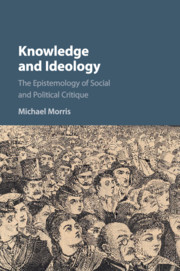Part I - The Dialectic of Ideology
Published online by Cambridge University Press: 17 November 2016
Summary
In Chapter 1, I lay out the basic conceptual framework that informs much of this study, drawing a distinction between the cognitive and the noncognitive dimensions of thought. In traditionally cognitive terms, beliefs and theories stand in intentional relations to objects in the world. They represent these intended objects in certain ways. They therefore have truth-values, and they stand in various relations of logical entailment. In the last few hundred years, however, we have increasingly turned our attention toward another dimension of thought, considering the associative, causal, and functional relations that connect beliefs and theories with noncognitive entities in their social, psychological, and biological environment. Additionally, we have come to consider how a range of epistemically irrelevant factors often shape the transmission and distribution of beliefs. Many developments have encouraged this new emphasis. In various ways, the functional critique of ideology, the development of empirical sociology, the increasingly pluralistic nature of society, the advent of public relations and political polling, and the increasing emphasis placed upon scientific categories and claims as the only fully legitimate arbiter of public discourse – these trends have all encouraged us to focus upon the social distributions, associations, causes, and effects of belief.
In Chapter 1 I argue that this recent attention to the noncognitive dimensions of thought promotes skepticism, and I consider how, beginning with Descartes, modern epistemology represents the attempt to free thought from the interests and the noncognitive social factors that attend more traditional or pre-reflective forms of belief acquisition. As sociology and the functional critique of ideology reveal the role that local interests and aims play in the formation of belief, we naturally seek some socially and historically abstracted form of cognition, one freed from all interests and local influences. However, as our conception of epistemology becomes increasingly rarified, its failure becomes more certain, and we face the evermore glaring divergence between our descriptive empirical accounts of actual belief formation and our ideal norms of justification.
As our descriptive and normative accounts of thought diverge, we might attempt to relate them in at least three different ways: (a) compatibilism, (b) positivism, and (c) universal noncognitivism.
- Type
- Chapter
- Information
- Knowledge and IdeologyThe Epistemology of Social and Political Critique, pp. 33 - 35Publisher: Cambridge University PressPrint publication year: 2016

